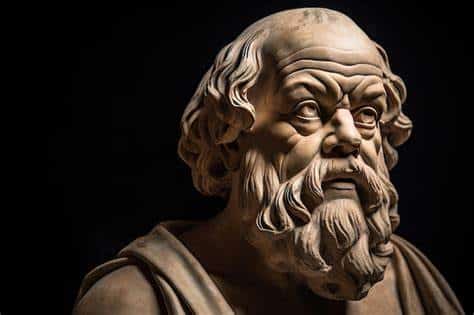Adverts
Ancient Greek phrases and maxims are not just words; they carry centuries of wisdom, refined humor, and profound teachings that still resonate in our everyday lives.

These thoughts, which emerged in one of the most brilliant periods in human history, connect us to names such as Socrates, Plato and Aristotle, as well as revealing a lot about the culture, values and reflections of a society that shaped the Western world.
Adverts
Throughout this content, you will discover epic quotes that have stood the test of time. Some are inspiring, others provocative, and many have a touch of irony that reflects the humor of ancient Greek thinkers.
These words have the power to illuminate our decisions, challenge our beliefs and even bring a smile to our faces — after all, Greek genius knew how to balance depth and lightness.
Adverts
Whether through philosophical reflections, ethical advice or even comical observations, the phrases of Greek sages continue to teach us a lot about the human condition.
Get ready to explore a rich and fascinating selection that promises to awaken new perspectives, whether in the field of self-knowledge, in the search for wisdom or even in moments of relaxation. 🏺✨

Phrases that define the wisdom of Ancient Greece 📜
“Know thyself” – The power of self-knowledge
If there is one phrase that carries the weight of Greek wisdom, it is this: “Know thyself” (or “Gnothi Seauton” in the original). Engraved in the Temple of Apollo in Delphi, this maxim is a direct invitation to reflect on who we are. The Greeks believed that self-knowledge was the key to a balanced and fulfilling life. After all, how can we make good decisions or seek what really matters without understanding our own motivations and limits?
Recommended Articles:
This idea, attributed to Socrates, goes beyond philosophy. Today, when we talk about emotional intelligence or even mindfulness, we are following in the footsteps of this ancient teaching. And isn't it amazing how this continues to be so relevant? In a world that bombards us with external information and expectations, knowing who we are is a revolutionary act. ✨
“Nothing in excess” – Balance is everything
Another iconic phrase that came straight from the brilliant minds of Ancient Greece is “Nothing in excess” (or “Meden Agan”). The Greeks were big fans of balance, and this maxim reflects that perfectly. The idea is simple: anything in excess, even something good, can become a problem. And let’s be honest, they weren’t wrong, right?
In practice, this phrase can be applied to almost everything in life: work, leisure, food, social media (hello, infinite scroll on TikTok). The concept of balance, or as they called it, “the right measure,” was central to Greek philosophy. For them, living well was about finding the sweet spot between extremes, something that continues to be a huge challenge to this day.
- Are you sleeping too much or too little?
- Are you dedicating yourself to work but forgetting about leisure?
- Or maybe you're living on pizza and brigadeiro, without even remembering what a salad is? 🥗
This phrase is a timeless reminder to seek harmony in everything we do. Apparently, the Greeks already knew how to avoid burnout, long before it became a trend on LinkedIn.
Greek phrases that bring humor and sarcasm 😄
“Men are so foolish that they even want to guess the future” – Aristophanes’ humorous critique
It is impossible to talk about epic quotes from Ancient Greece without mentioning the touch of humor that many thinkers brought to their reflections. Aristophanes, one of the greatest playwrights of Greek comedy, knew how to provoke laughter while making sharp criticisms of society. This particular quote is a slap in the face to those who are always trying to control the future. And let's be honest, who hasn't, right?
It’s as if Aristophanes were saying, “Friend, relax! Life is unpredictable, and that’s what makes it so interesting.” If we think about it, this message still resonates today. With so many “trend” predictions and gurus promising magic formulas for success, sometimes the best thing to do is simply live in the present and stop trying to guess what’s coming next.
Imagine if Aristophanes were alive today? He would probably be making jokes about Instagram horoscopes or TikTok tarot videos. 😂
“Woman is the greatest source of trouble” – The controversial Hesiod
Okay, this sentence deserves a big “calm down”! Hesiod, author of the poem “Theogony”, said this gem that would be highly canceled today. The sentence reflects much of the thinking of the time, but can also be read as a humorous critique of the dramas of human relationships. For Hesiod, the introduction of women into Greek mythology (read Pandora) was the beginning of all the world’s problems.
While this idea is clearly a reflection of ancient Greek patriarchal values, it’s also an example of how the Greeks used sarcasm to express their worldviews. And remember, this type of humor hasn’t aged all that well, but it can still make us think about the absurdities of generalizations, both then and now.
Hesiod may or may not have said this ironically, but the truth is that the phrase invites us to reflect on human relationships and how we often blame others (or even an entire group) for our own problems. Has anyone ever used this excuse? 👀

Greek phrases to inspire modern life 🌟
“Happiness depends on ourselves” – Aristotle’s optimism
Let's face it, Aristotle knew his stuff! This quote, in particular, is one of the most optimistic and motivating quotes that Ancient Greece left us. While many people focused on the challenges and difficulties of life, Aristotle placed the responsibility for our own happiness in our own hands. It seems simple, but it's really profound, right?
In practice, this means that it doesn’t matter so much what happens outside, but how we react to it. Happiness is a daily choice, a construction that requires effort, patience and self-knowledge. And this connects a lot with what we seek today, whether in discourses on mental health or personal development.
- How about starting the day with a small habit that does you good?
- Or maybe stop waiting for the “perfect moment” to be happy?
- Because, as Aristotle would say, happiness is in our hands! 🤲
“Whoever learns to die unlearns to be a slave” – Epictetus and inner freedom
This quote from Epictetus may seem somber at first glance, but it is actually one of the most liberating in Stoic philosophy. For him, accepting mortality was the first step to living fully. The idea is simple: when we stop fearing death, we also stop being slaves to the fear and uncertainty that hold us back.
It's the kind of phrase that slaps us in the face and reminds us that life is too short to waste time worrying about useless things. And you know what's even crazier? Even after centuries, this thought continues to be super valid. How many times have we stopped ourselves from doing something because we were afraid? Or have we gotten stuck in uncomfortable situations because we're afraid of what comes next?
Epictetus invites us to look beyond these fears and seek an inner freedom that no one can take away from us. Is this something you should tattoo on your arm or not? 💪

Greek phrases that make us question everything 🤯
“I only know that I know nothing” – Socrates’ paradox
Ah, Socrates… The king of phrases that leave us thinking for hours. “I only know that I know nothing” is, without a doubt, one of the most enigmatic and powerful statements in philosophy. With it, Socrates was not saying that he was ignorant, but rather acknowledging that true knowledge comes from the humility of admitting how much we still have to learn.
If there is one thing we can take away from this phrase, it is the importance of curiosity and continuous learning. In a world where everyone seems to have an opinion about everything, perhaps wisdom lies precisely in knowing how to listen, question and accept that we do not always have all the answers.
- Have you ever stopped to think about how the internet is full of “experts” in everything? 🤔
- Socrates teaches us that, before giving an opinion, it is worth asking: “Do I really know this?”
- And, above all, never stop seeking knowledge.
“Justice is nothing more than the convenience of the strongest” – The provocation of Thrasymachus
This controversial quote from Thrasymachus, which appears in Plato’s work “The Republic,” is one of the most challenging in Ancient Greece. It makes us question the concept of justice and who really benefits from laws and social systems. Is justice truly universal? Or does it change according to the interests of those in power?
It is a reflection that still resonates today, especially when we think about the inequalities and power structures that shape the world. Thrasymachus forces us to step out of our comfort zone and look at justice in a more critical way. After all, is what we consider fair really fair for everyone?
This is one of those phrases that sticks in your head, provoking and deconstructing our certainties. And perhaps that was exactly the intention of the Greeks: to make us think, question and seek answers, even if they are never definitive. 🤷♂️
Conclusion
To the epic phrases from ancient greece continue to inspire us and teach us valuable lessons, even after centuries of history. 💡 These words of wisdom, filled with humor and depth, not only reflect the brilliance of the great Greek thinkers, but also show how human questions — such as ethics, morality, and the pursuit of happiness — are timeless. 🌟
Whether through the teachings of Socrates, Plato or Aristotle, or even in popular sayings passed down through the ages, Ancient Greece has gifted us with ideas and reflections that transcend time. They invite us to think, question and seek a more balanced and meaningful life. In addition, the subtle humor present in some phrases adds a touch of lightness to the wisdom, making them even more memorable. 😊
Therefore, by revisiting these words, we are not only honoring the rich cultural heritage of Greek civilization, but also acquiring tools to reflect on the modern world and the challenges we face. After all, the wisdom of Ancient Greece is a powerful reminder that despite changes over the centuries, fundamental human values remain the same. ⚖️
So why not incorporate these lessons into your daily life? Get inspired and let the wisdom of the ancients echo in your actions and thoughts! 🌿




